For ideal athletic recovery as a senior, aim for 7-9 hours of sleep, maintain a cool bedroom (60-68°F), and establish consistent sleep-wake times. Create a screen-free wind-down routine 30 minutes before bed, complete workouts at least 3 hours before sleeping, and consume 20-30g of protein with evening meals. Practice relaxation techniques like meditation or gentle stretching, minimize noise with white noise machines, and keep your bedroom dark with blackout curtains. These habits will transform your recovery potential.
10 Best Sleep Habits For Senior Athletic Recovery
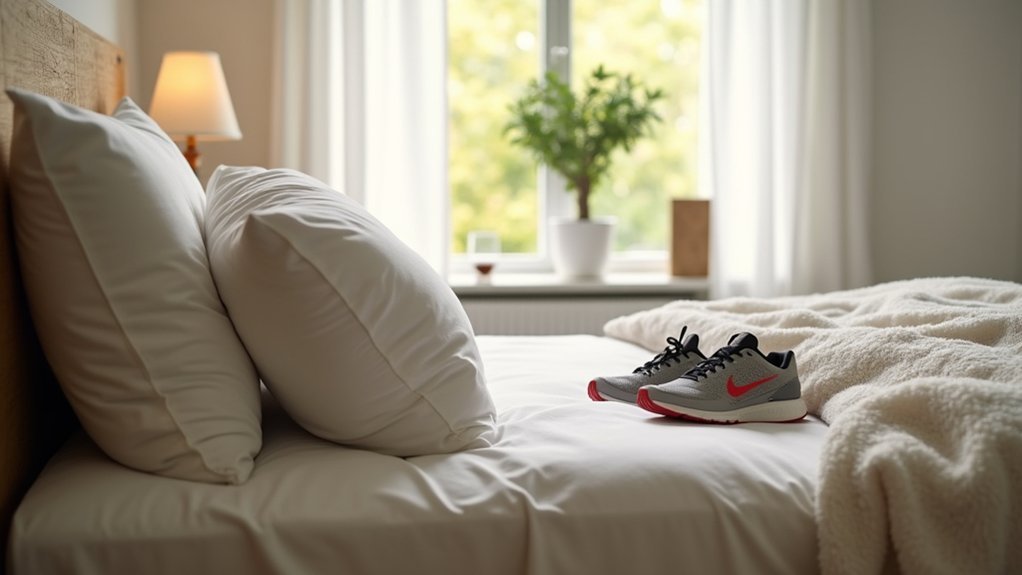
While aging naturally affects recovery time, proper sleep can greatly counteract these effects for older athletes. Aim for 7-9 hours of uninterrupted sleep each night to support hormone production essential for muscle repair and growth.
Establish a consistent sleep schedule that aligns with your body’s circadian rhythms to enhance sleep quality. Create an ideal sleep environment by keeping your bedroom cool (16-20°C), dark, and quiet.
Before bed, practice relaxation techniques like meditation or gentle stretching to ease into sleep more effectively.
If you’re struggling with nighttime sleep, consider incorporating short 20-30 minute naps during the day to supplement your recovery.
These sleep habits will help you maintain athletic performance despite age-related challenges to recovery.
Prioritize 7-9 Hours of Uninterrupted Sleep
For senior athletes, getting 7-9 hours of uninterrupted sleep represents the cornerstone of effective recovery. This ideal sleep duration supports the natural decline in growth hormone and testosterone that occurs as you age, directly impacting your body’s ability to repair muscle tissue.
| Sleep Duration | Effect on Recovery | Implementation Strategy |
|---|---|---|
| <6 hours | Increased soreness | Set consistent bedtime |
| 6-7 hours | Partial recovery | Limit evening screen time |
| 7-9 hours | Ideal muscle repair | Create a dark, cool bedroom |
| >9 hours | Diminishing returns | Maintain same wake time |
| Interrupted | Reduced sleep quality | Address sleep disturbances |
Despite its importance, only 20% of seniors consistently achieve this recommended sleep duration. By prioritizing a consistent sleep schedule, you’ll enhance your sleep quality and maximize recovery potential, ultimately maintaining your athletic performance longer.
Create a Cool, Dark, and Quiet Sleep Environment
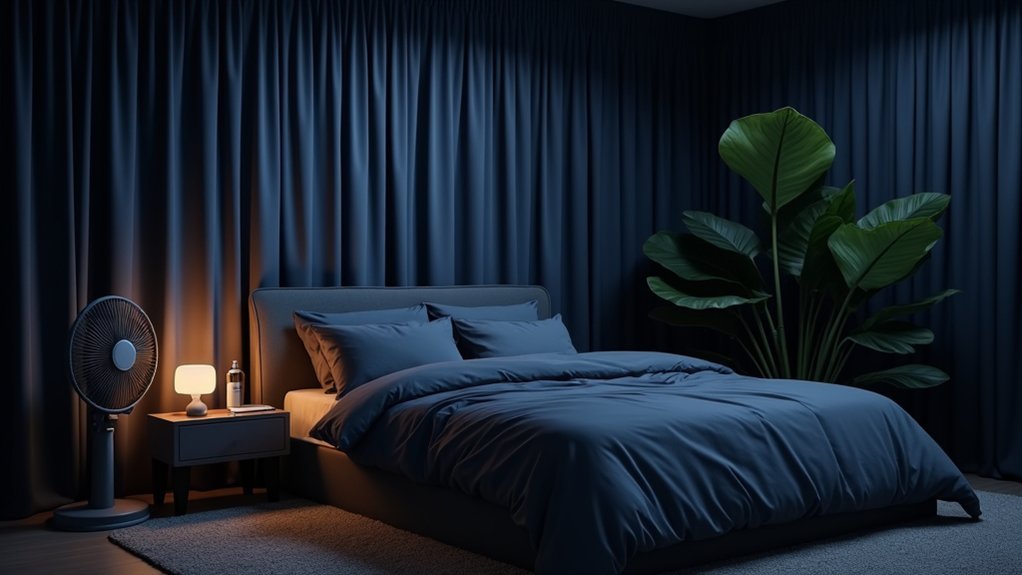
Environmental factors play an essential role in sleep quality for senior athletes seeking ideal recovery. Set your bedroom temperature between 16-20°C (60-68°F) to optimize your cool sleep environment, which promotes deeper, more restorative sleep.
Install blackout curtains or use an eye mask to create a dark environment that enhances melatonin production and supports faster sleep onset.
Minimize noise levels by soundproofing your bedroom when possible. Consider using white noise machines or earplugs to mask disruptive sounds, greatly improving sleep efficiency and reducing nighttime awakenings.
Don’t overlook the importance of keeping your bedroom organized and clutter-free—a tidy space creates a restful atmosphere that reduces pre-sleep anxiety.
These environmental adjustments will maximize your athletic recovery by ensuring your sleep quality remains consistently high.
Establish a Consistent Pre-Sleep Routine
Beyond optimizing your sleep environment, creating a predictable pre-sleep ritual greatly improves recovery outcomes for senior athletes. Set an alarm 20 minutes before bedtime to signal your body it’s time to shift from daily activities to rest mode.
Incorporate relaxing activities like meditation, gentle stretching, or reading to enhance your sleep quality and promote muscle recovery. Avoid bright lights and screens at least an hour before bed, as they interfere with melatonin production—the hormone responsible for regulating sleep cycles.
Prepare tomorrow’s workout clothes and gear before you sleep to reduce morning stress. This small habit contributes to better sleep hygiene while creating a peaceful mindset.
For senior athletes, these consistent pre-sleep routines aren’t luxuries—they’re essential recovery tools that maximize your body’s natural healing processes overnight.
Limit Screen Time Before Bedtime

Three vital hours before bedtime represent the danger zone where screen exposure can sabotage your recovery as a senior athlete.
Research shows screens within an hour of sleep can increase sleep latency by 60%, delaying your body’s essential recovery processes. The blue light emitted disrupts melatonin production, making it harder to fall asleep and stay asleep.
For ideal athletic recovery, implement these sleep hygiene tips: establish a screen-free wind-down routine at least 30 minutes before bed, as recommended by sleep experts.
Replace scrolling with reading physical books or practicing relaxation techniques. You’ll experience fewer nighttime awakenings and more restorative sleep quality, which is vital for muscle repair.
Optimize Your Recovery With Strategic Napping
Strategic napping represents a powerful yet underutilized recovery tool for senior athletes. When you incorporate 20-90 minute naps into your training schedule, you’ll enhance both your muscle recovery and cognitive function.
Napping effectively counters the effects of poor nighttime sleep, helping you maintain peak performance levels during competitions.
- Plan naps around your training schedule to strategically “bank” sleep and reduce injury risk
- Use afternoon naps to offset anxiety and competition-related stress
- Keep naps between 20-90 minutes to avoid disrupting nighttime sleep patterns
- Accumulate additional sleep through regular short naps to accelerate recovery
- Combat fatigue with strategic napping to improve reaction time during competitive events
Time Your Exercise to Support Sleep Quality
Jumpstart your day with a morning workout to naturally enhance your energy levels while setting up ideal sleep patterns for the night ahead.
Your body benefits most when you complete moderate to vigorous exercise at least 2-3 hours before bedtime, preventing elevated heart rate and adrenaline from disrupting your sleep onset.
Regular resistance training or aerobic activities like swimming earlier in the day can greatly improve your sleep quality and duration, helping your athletic body recover more effectively.
Morning Energy Boost
Establishing a morning exercise routine creates a powerful foundation for senior athletes’ recovery cycles. By exercising early, you’re setting your circadian rhythms for ideal sleep quality later.
Morning workouts expose you to natural light, triggering melatonin production that regulates your sleep-wake cycle. You’ll avoid the potential sleep disruptions that can occur with evening exercise while building a recovery rhythm that serves your athletic goals.
- Morning exercise increases both sleep duration and efficiency for senior athletes
- Early workouts help regulate your body’s internal clock through natural light exposure
- You’ll experience improved alertness and energy throughout your day
- Regular morning activity reduces insomnia symptoms
- Your recovery improves as your sleep quality deepens with consistent morning exercise
Avoid Late Workouts
While morning workouts benefit your recovery cycle, exercising too close to bedtime can seriously undermine your sleep quality. As a senior athlete, you should finish your vigorous exercise at least three hours before bedtime to prevent elevated cortisol levels and body temperature from disrupting your sleep.
Late-night intense workouts can decrease sleep efficiency and reduce the restorative sleep stages vital for your recovery. Instead, align your exercise timing with your natural circadian rhythms by scheduling moderate-intensity sessions in the morning or afternoon. This approach enhances your mood and energy while supporting ideal sleep patterns.
If you crave evening movement, replace high-intensity training with gentle alternatives like yoga or stretching. These relaxation-focused activities prepare your body for rest without compromising the quality sleep that’s essential for senior athletic recovery.
Adjust Your Nutrition for Better Sleep
Timing your protein consumption to include a small serving before bed can greatly enhance your overnight muscle recovery while you sleep.
You’ll want to avoid inflammatory foods like processed sugars and refined carbohydrates in the evening hours, as they can disrupt sleep cycles and compromise your body’s repair processes.
Time Protein Intake Strategically
For senior athletes seeking perfect recovery, strategic protein consumption can transform your sleep into a powerful recovery tool. Your evening protein timing works with your body’s natural rhythms to maximize muscle repair while you rest. Aim for 20-30 grams of protein with evening meals to combat age-related muscle loss and support overnight recovery.
- Consume protein within two hours after exercise to reduce soreness and improve muscle function.
- Include slow-digesting proteins like casein before bedtime for steady amino acid release.
- Align protein intake with your circadian rhythms for enhanced muscle protein synthesis.
- Target the 20-30 gram sweet spot per meal for ideal recovery benefits.
- Pair evening protein with other sleep-supporting nutrients to create a recovery-focused nighttime routine.
Avoid Inflammatory Foods
Inflammatory foods can silently sabotage your recovery efforts by disrupting sleep quality and prolonging muscle repair time.
As a senior athlete, your body’s inflammatory response already tends to be heightened, making dietary choices especially important.
Eliminate processed sugars and trans fats from your evening meals, replacing them with omega-3 fatty acids found in salmon and walnuts to reduce inflammation and promote deeper sleep.
Load your plate with antioxidants-rich foods like berries, dark leafy greens, and tart cherries to combat oxidative stress and enhance recovery.
Remember to avoid caffeine at least six hours before bedtime and limit alcohol consumption, as both greatly impair sleep quality.
Manage Stress With Relaxation Techniques
Three key physiological systems—nervous, hormonal, and muscular—benefit when senior athletes incorporate relaxation techniques into their recovery routines.
By practicing deep breathing, meditation, or progressive muscle relaxation, you’ll reduce cortisol levels and greatly improve sleep quality. Mindfulness can decrease sleep disturbances by 30%, helping you maintain consistent sleep patterns essential for athletic recovery.
- Evening yoga or gentle stretching can improve sleep duration by 40%
- Regular mindfulness practice reduces insomnia symptoms and enhances sleep efficiency
- Guided imagery techniques decrease sleep onset time by 20%
- Deep breathing exercises directly lower stress hormones that interfere with sleep
- A consistent bedtime relaxation routine signals your body it’s time to recover
Establishing these practices creates a powerful sleep schedule that supports your overall recovery, allowing you to continue performing at your best.
Address Age-Related Sleep Challenges
You’ll need strategic approaches to combat sleep fragmentation that commonly affects older athletes, including creating a consistent bedtime routine and optimizing your sleep environment.
Adjusting to age-related circadian rhythm shifts requires earlier bedtimes that align with your natural biology, while maximizing morning light exposure to regulate your sleep-wake cycle.
Be proactive about discussing sleep-disrupting medication side effects with your healthcare provider, as many commonly prescribed medications for older adults can interfere with restorative sleep quality.
Combat Sleep Fragmentation Issues
As athletes age, sleep fragmentation becomes a formidable obstacle to recovery, characterized by frequent nighttime awakenings that disrupt the natural sleep cycle.
This fragmentation reduces your deep sleep and REM sleep phases—crucial stages for muscle repair and hormone regulation. To combat these issues, you’ll need targeted strategies that restore sleep continuity.
- Establish a consistent sleep schedule, going to bed and waking at the same times daily
- Create a calming pre-sleep routine to signal your body it’s time to wind down
- Optimize environmental factors by keeping your bedroom cool, dark, and quiet
- Engage in moderate exercise earlier in the day to promote better sleep architecture
- Minimize evening disruptions like electronics, caffeine, and alcohol that fragment sleep
Manage Circadian Rhythm Shifts
The body’s internal clock undergoes significant changes with age, often leaving senior athletes struggling with disrupted sleep patterns that hinder recovery.
As an older adult, you’ll notice decreased deep and REM sleep, which are essential for muscle repair and hormone regulation.
To reset your circadian rhythm, expose yourself to natural sunlight for at least 30 minutes daily. This morning light exposure signals your brain that it’s time to be alert, improving sleep quality when night falls.
Maintain a consistent sleep schedule by going to bed and waking up at the same time every day, including weekends.
Before bedtime, incorporate relaxation techniques like meditation or gentle yoga to address age-related sleep challenges.
These sleep habits aren’t just preferences—they’re essential tools that optimize your recovery and athletic performance despite age-related changes.
Tackle Medication Side Effects
Many senior athletes find their sleep quality sabotaged by both age-related changes and medication side effects, creating a double challenge for recovery.
As an older adult, you’re likely taking multiple medications that might be silently disrupting your sleep cycle and hindering your athletic recovery process.
- Review all medications with your doctor specifically for sleep-related side effects
- Consider taking blood pressure medications and other sleep-disrupting drugs earlier in the day
- Track your sleep quality when starting new medications to identify potential problems
- Explore cognitive behavioral therapy for insomnia as an effective non-drug alternative
- Request medication management evaluation if experiencing persistent sleep issues or excessive daytime sleepiness
Addressing these medication-related sleep disturbances can greatly improve both your sleep quality and athletic performance, giving your body the restorative rest needed for ideal recovery.
Frequently Asked Questions
What Is the Best Sleep Schedule for Athletes?
Aim for 7-9 hours of sleep nightly. You should maintain a consistent schedule, going to bed and waking at the same times. Don’t forget to plan proper wind-down time after training to enhance recovery.
How Many Hours of Sleep for Optimal Recovery?
You’ll need 7-9 hours of uninterrupted sleep nightly for ideal recovery. As you age, aim closer to 9 hours to support muscle repair, hormone regulation, and cognitive function. Don’t compromise on sleep quality.
How Much Sleep Do Older Athletes Need?
As an older athlete, you’ll need 7-9 hours of sleep nightly, often closer to 9 hours. You’re likely to require more rest than younger counterparts since your body demands additional recovery time with age.
What Sleep Stage Is Best for Muscle Recovery?
Slow-wave sleep is best for your muscle recovery. During this deep sleep stage, your body releases growth hormone to repair tissues and build muscle. You’ll want to maximize this phase for ideal recovery.
In Summary
You’ve now got ten powerful strategies to maximize your recovery through better sleep. As a senior athlete, quality rest isn’t a luxury—it’s essential for performance and longevity. Implement these habits consistently, and you’ll notice improved energy, faster recovery, and better athletic performance. Remember, prioritizing sleep is just as important as your training plan. Your body will thank you with enhanced strength and endurance.


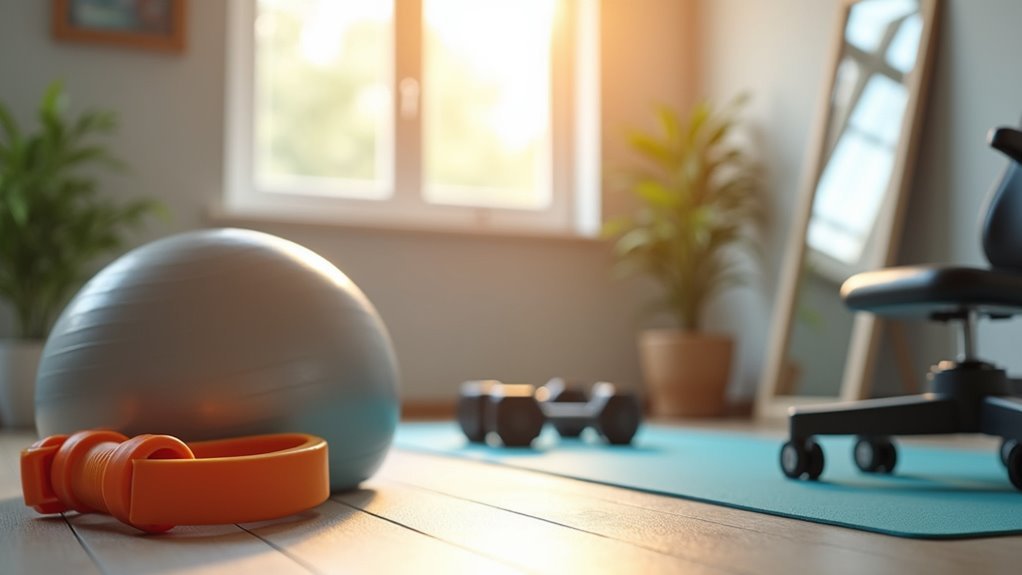
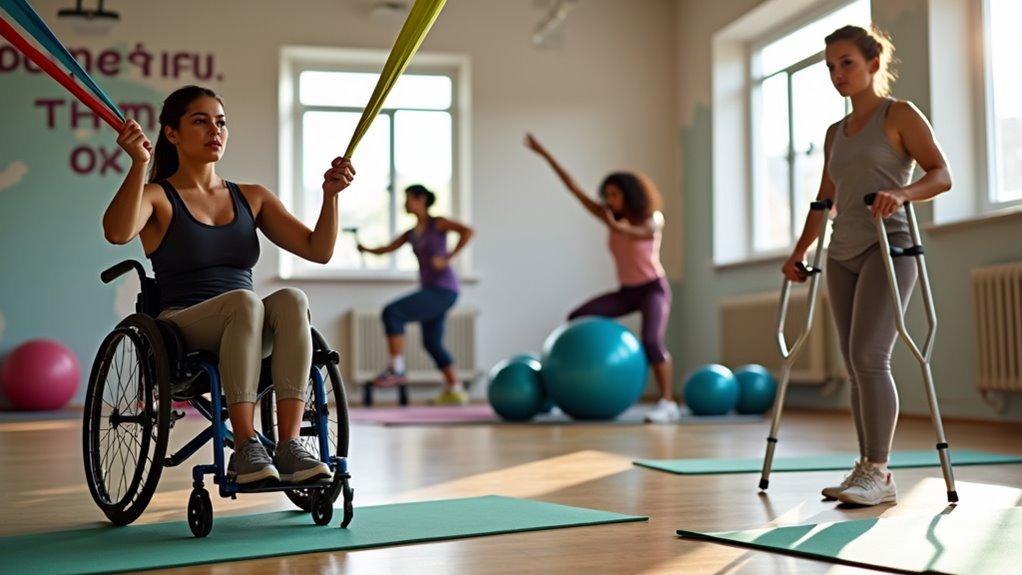
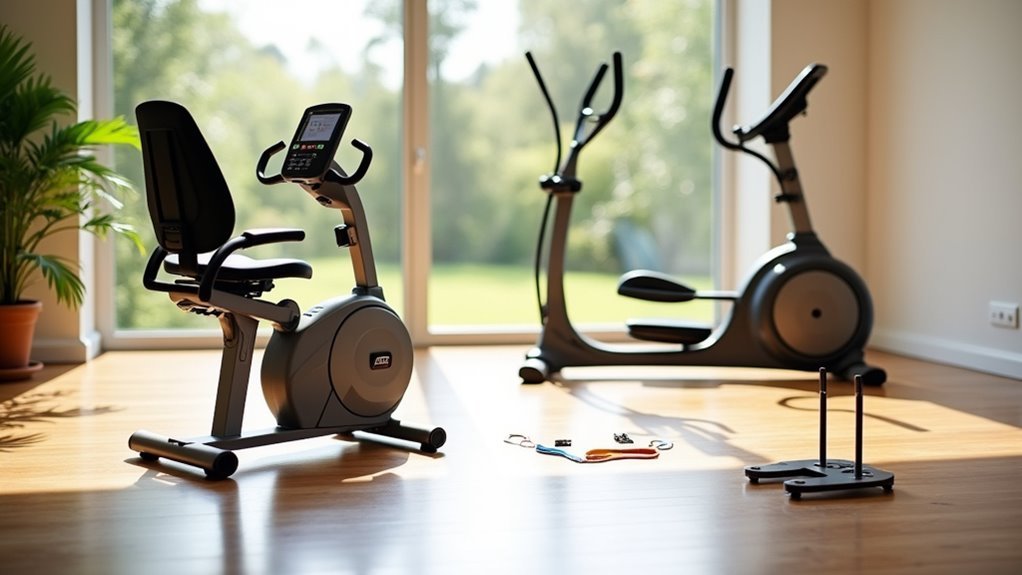
Leave a Reply